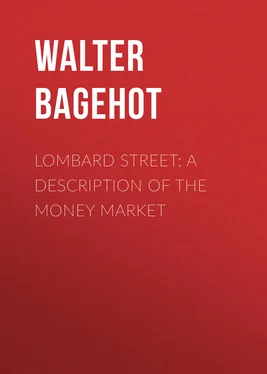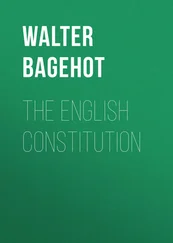Walter Bagehot - Lombard Street - A Description of the Money Market
Здесь есть возможность читать онлайн «Walter Bagehot - Lombard Street - A Description of the Money Market» — ознакомительный отрывок электронной книги совершенно бесплатно, а после прочтения отрывка купить полную версию. В некоторых случаях можно слушать аудио, скачать через торрент в формате fb2 и присутствует краткое содержание. Жанр: foreign_prose, История, foreign_edu, foreign_antique, на английском языке. Описание произведения, (предисловие) а так же отзывы посетителей доступны на портале библиотеки ЛибКат.
- Название:Lombard Street: A Description of the Money Market
- Автор:
- Жанр:
- Год:неизвестен
- ISBN:нет данных
- Рейтинг книги:4 / 5. Голосов: 1
-
Избранное:Добавить в избранное
- Отзывы:
-
Ваша оценка:
- 80
- 1
- 2
- 3
- 4
- 5
Lombard Street: A Description of the Money Market: краткое содержание, описание и аннотация
Предлагаем к чтению аннотацию, описание, краткое содержание или предисловие (зависит от того, что написал сам автор книги «Lombard Street: A Description of the Money Market»). Если вы не нашли необходимую информацию о книге — напишите в комментариях, мы постараемся отыскать её.
Lombard Street: A Description of the Money Market — читать онлайн ознакомительный отрывок
Ниже представлен текст книги, разбитый по страницам. Система сохранения места последней прочитанной страницы, позволяет с удобством читать онлайн бесплатно книгу «Lombard Street: A Description of the Money Market», без необходимости каждый раз заново искать на чём Вы остановились. Поставьте закладку, и сможете в любой момент перейти на страницу, на которой закончили чтение.
Интервал:
Закладка:
The directors of the Bank are, therefore, in fact, if not in name, trustees for the public, to keep a banking reserve on their behalf; and it would naturally be expected either that they distinctly recognized this duty and engaged to perform it, or that their own self-interest was so strong in the matter that no engagement was needed. But so far from there being a distinct undertaking on the part of the Bank directors to perform this duty, many of them would scarcely acknowledge it, and some altogether deny it. Mr. Hankey, one of the most careful and most experienced of them, says in his book on the Bank of England, the best account of the practice and working of the Bank which anywhere exists—'I do not intend here to enter at any length on the subject of the general management of the Bank, meaning the Banking Department, as the principle upon which the business is conducted does not differ, as far as I am aware, from that of any well-conducted bank in London.' But, as anyone can see by the published figures, the Banking Department of the Bank of England keeps as a great reserve in bank notes and coin between 30 and 50 per cent of its liabilities, and the other banks only keep in bank notes and coin the bare minimum they need to open shop with. And such a constant difference indicates, I conceive, that the two are not managed on the same principle.
The practice of the Bank has, as we all know, been much and greatly improved. They do not now manage like the other Banks in Lombard Street. They keep an altogether different kind and quantity of reserve; but though the practice is mended the theory is not. There has never been a distinct resolution passed by the Directors of the Bank of England, and communicated by them to the public, stating even in the most general manner, how much reserve they mean to keep or how much they do not mean, or by what principle in this important matter they will be guided.
The position of the Bank directors is indeed most singular. On the one side a great city opinion—a great national opinion, I may say, for the nation has learnt much from many panics—requires the directors to keep a large reserve. The newspapers, on behalf of the nation, are always warning the directors to keep it, and watching that they do keep it; but, on the other hand, another less visible but equally constant pressure pushes the directors in exactly the reverse way, and inclines them to diminish the reserve.
This is the natural desire of all directors to make a good dividend for their shareholders. The more money lying idle the less, caeteris paribus , is the dividend; the less money lying idle the greater is the dividend. And at almost every meeting of the proprietors of the Bank of England, there is a conversation on this subject. Some proprietor says that he does not see why so much money is kept idle, and hints that the dividend ought to be more.
Indeed, it cannot be wondered at that the Bank proprietors do not quite like their position. Theirs is the oldest bank in the City, but their profits do not increase, while those of other banks most rapidly increase. In 1844, the dividend on the stock of the Bank of England was 7 per cent, and the price of the stock itself 212; the dividend now is 9 per cent, and the price of the stock 232. But in the same time the shares of the London and Westminster Bank, in spite of an addition of 100 per cent to the capital, have risen from 27 to 66, and the dividend from 6 per cent to 20 per cent. That the Bank proprietors should not like to see other companies getting richer than their company is only natural.
Some part of the lowness of the Bank dividend, and of the consequent small value of Bank stock, is undoubtedly caused by the magnitude of the Bank capital; but much of it is also due to the great amount of unproductive cash—of cash which yields no interest—that the Banking Department of the Bank of England keeps lying idle. If we compare the London and Westminster Bank—which is the first of the joint-stock banks in the public estimation and known to be very cautiously and carefully managed—with the Bank of England, we shall see the difference at once. The London and Westminster has only 13 per cent of its liabilities lying idle. The Banking Department of the Bank of England has over 40 per cent. So great a difference in the management must cause, and does cause, a great difference in the profits. Inevitably the shareholders of the Bank of England will dislike this great difference; more or less, they will always urge their directors to diminish (as far as possible) the unproductive reserve, and to augment as far as possible their own dividend.
In most banks there would be a wholesome dread restraining the desire of the shareholders to reduce the reserve; they would fear to impair the credit of the bank. But fortunately or unfortunately, no one has any fear about the Bank of England. The English world at least believes that it will not, almost that it cannot, fail. Three times since 1844 the Banking Department has received assistance, and would have failed without it. In 1825, the entire concern almost suspended payment; in 1797, it actually did so. But still there is a faith in the Bank, contrary to experience, and despising evidence. No doubt in every one of these years the condition of the Bank, divided or undivided, was in a certain sense most sound; it could ultimately have paid all its creditors all it owed, and returned to its shareholders all their own capital. But ultimate payment is not what the creditors of a bank want; they want present, not postponed, payment; they want to be repaid according to agreement; the contract was that they should be paid on demand, and if they are not paid on demand they may be ruined. And that instant payment, in the years I speak of, the Bank of England certainly could not have made. But no one in London ever dreams of questioning the credit of the Bank, and the Bank never dreams that its own credit is in danger. Somehow everybody feels the Bank is sure to come right. In 1797, when it had scarcely any money left, the Government said not only that it need not pay away what remained, but that it must not. The 'effect of letters of licence' to break Peel's Act has confirmed the popular conviction that the Government is close behind the Bank, and will help it when wanted. Neither the Bank nor the Banking Department have ever had an idea of being put 'into liquidation;' most men would think as soon of 'winding up' the English nation.
Since then the Bank of England, as a bank, is exempted from the perpetual apprehension that makes other bankers keep a large reserve the apprehension of discredit—it would seem particularly necessary that its managers should be themselves specially interested in keeping that reserve, and specially competent to keep it. But I need not say that the Bank directors have not their personal fortune at stake in the management of the Bank. They are rich City merchants, and their stake in the Bank is trifling in comparison with the rest of their wealth. If the Bank were wound up, most of them would hardly in their income feel the difference. And what is more, the Bank directors are not trained bankers; they were not bred to the trade, and do not in general give the main power of their minds to it. They are merchants, most of whose time and most of whose real mind are occupied in making money in their own business and for themselves.
It might be expected that as this great public duty was cast upon the Banking Department of the Bank, the principal statesmen (if not Parliament itself) would have enjoined on them to perform it. But no distinct resolution of Parliament has ever enjoined it; scarcely any stray word of any influential statesman. And, on the contrary, there is a whole catena of authorities, beginning with Sir Robert Peel and ending with Mr. Lowe, which say that the Banking Department of the Bank of England is only a Bank like any other bank—a Company like other companies; that in this capacity it has no peculiar position, and no public duties at all. Nine-tenths of English statesmen, if they were asked as to the management of the Banking Department of the Bank of England, would reply that it was no business of theirs or of Parliament at all; that the Banking Department alone must look to it.
Читать дальшеИнтервал:
Закладка:
Похожие книги на «Lombard Street: A Description of the Money Market»
Представляем Вашему вниманию похожие книги на «Lombard Street: A Description of the Money Market» списком для выбора. Мы отобрали схожую по названию и смыслу литературу в надежде предоставить читателям больше вариантов отыскать новые, интересные, ещё непрочитанные произведения.
Обсуждение, отзывы о книге «Lombard Street: A Description of the Money Market» и просто собственные мнения читателей. Оставьте ваши комментарии, напишите, что Вы думаете о произведении, его смысле или главных героях. Укажите что конкретно понравилось, а что нет, и почему Вы так считаете.












